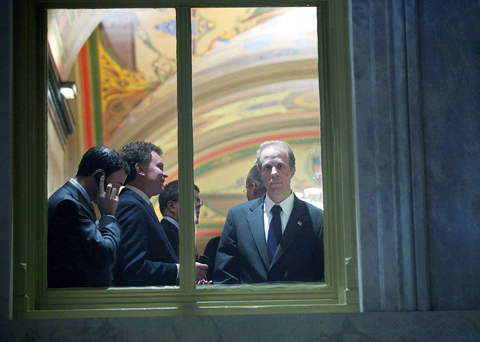Clients with more than US$5.5 billion invested in hedge funds controlled by Cerberus Capital Management have told the firm that they want their money back.
About 71 percent of the investors in the two Cerberus Partners funds want their assets moved into a new vehicle that will be liquidated as market conditions improve, Stephen Feinberg, who runs Cerberus, wrote in a letter to clients delivered late on Thursday.
The withdrawals would leave about US$2.2 billion of assets in the funds.

PHOTO: NY TIMES NEWS SERVICE
“We have been surprised by this response,” Feinberg and his cofounder, William Richter, wrote in the letter, which was first reported by the Wall Street Journal on Friday.
A spokesman for Cerberus, which oversees about US$24 billion in assets, declined to comment.
While Feinberg said most of the firm’s clients continued to support the investment strategy, the mass exodus of investors is another black eye for the firm. The firm, which prefers to operate out of the public eye, has suffered from several prominent investments — most notably its investment in Chrysler — that left the funds down 24.5 percent last year.
Some of those positions have recovered slightly, but the funds were unable to join the broad market recovery this year because they had little new cash to invest, a person close to the firm said.
Clients were also upset at the firm for suspending withdrawal requests at the end of last year, a move made by other funds with similarly poor performance. More than half of the clients were so-called funds of hedge funds, which experienced widespread redemptions of their own last year.
Last month, Cerberus decided to restructure the funds, offering clients who chose not to liquidate the ability to roll any future profits into a new hedge fund with sharply reduced fees.
But the incentives did not seem to work, an indication that Cerberus’ 17-year track record of making money for clients had suffered in the downturn.
Feinberg has told investors that he still believed the investments in the Cerberus Partners funds would be profitable over time and that he did not want to sell securities and other assets in a down market.
But the loss of fee income on more than US$5.5 billion in capital could prompt talented traders and investment professionals to leave for better-paying firms. Investors who are considering staying with the firm are also concerned that the liquidations will push down the value of their investments as they are sold off.
“We are embarrassed and disappointed by our 2008 performance, and we feel an obligation to you to turn this around,” Feinberg said in the letter last month announcing the restructuring. “But we just don’t know when and how much pain we must take before that happens.”
The comments differ markedly from Feinberg’s confident tone last September when he told investors that “none of our problem positions are large enough to create a real return problem for the fund.”
Along with Chrysler, those “problem positions” included high-profile bets on GMAC and the residential mortgage company ResCap. Those have taken a toll on Cerberus’ reputation.
“We never intended to receive the publicity surrounding those investments,” Feinberg wrote in the letter.

SEEKING CLARITY: Washington should not adopt measures that create uncertainties for ‘existing semiconductor investments,’ TSMC said referring to its US$165 billion in the US Taiwan Semiconductor Manufacturing Co (TSMC, 台積電) told the US that any future tariffs on Taiwanese semiconductors could reduce demand for chips and derail its pledge to increase its investment in Arizona. “New import restrictions could jeopardize current US leadership in the competitive technology industry and create uncertainties for many committed semiconductor capital projects in the US, including TSMC Arizona’s significant investment plan in Phoenix,” the chipmaker wrote in a letter to the US Department of Commerce. TSMC issued the warning in response to a solicitation for comments by the department on a possible tariff on semiconductor imports by US President Donald Trump’s

The government has launched a three-pronged strategy to attract local and international talent, aiming to position Taiwan as a new global hub following Nvidia Corp’s announcement that it has chosen Taipei as the site of its Taiwan headquarters. Nvidia cofounder and CEO Jensen Huang (黃仁勳) on Monday last week announced during his keynote speech at the Computex trade show in Taipei that the Nvidia Constellation, the company’s planned Taiwan headquarters, would be located in the Beitou-Shilin Technology Park (北投士林科技園區) in Taipei. Huang’s decision to establish a base in Taiwan is “primarily due to Taiwan’s talent pool and its strength in the semiconductor

Industrial production expanded 22.31 percent annually last month to 107.51, as increases in demand for high-performance computing (HPC) and artificial intelligence (AI) applications drove demand for locally-made chips and components. The manufacturing production index climbed 23.68 percent year-on-year to 108.37, marking the 14th consecutive month of increase, the Ministry of Economic Affairs said. In the first four months of this year, industrial and manufacturing production indices expanded 14.31 percent and 15.22 percent year-on-year, ministry data showed. The growth momentum is to extend into this month, with the manufacturing production index expected to rise between 11 percent and 15.1 percent annually, Department of Statistics

An earnings report from semiconductor giant and artificial intelligence (AI) bellwether Nvidia Corp takes center stage for Wall Street this week, as stocks hit a speed bump of worries over US federal deficits driving up Treasury yields. US equities pulled back last week after a torrid rally, as investors turned their attention to tax and spending legislation poised to swell the US government’s US$36 trillion in debt. Long-dated US Treasury yields rose amid the fiscal worries, with the 30-year yield topping 5 percent and hitting its highest level since late 2023. Stocks were dealt another blow on Friday when US President Donald